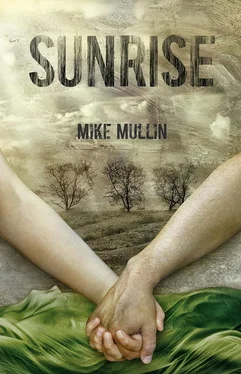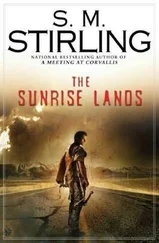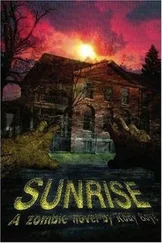We made great time, reaching the Illinois side of the Mississippi, just before dark on the second day. Uncle Paul and Darla had modified one of the Bikezillas with a small battery pack and pedal-powered electrical generator that allowed us to run a shortwave transceiver and stay in touch with Speranta. The gleaner, Grant, had turned up offering to sell us another transceiver at a ridiculous price, and after hours of haggling with him, I had bought it. We could listen to transmissions any time, but to send our own farther than a couple of miles, we had to stop and string an antenna. Each night, I spoke with Rebecca and
Darla via the shortwave. Rebecca hadn’t heard anything from Worthington. Darla was fuming at being left in charge of Speranta—she hadn’t been able to work with Uncle Paul at all since I left, but it sounded like everything was running smoothly in my absence.
The next morning we rode across the frozen Mississippi—a five-mile trek. When we arrived in Bellevue, Iowa, midmorning, it was empty and abandoned. Rita Mae and the folks from Worthington were nowhere to be found.
Nylce sent out nearly a hundred scouts in small groups. If Rita Mae was still on her way from Worthington, it would be easy to miss her. We left a group hidden on the second floor of one of the old brick buildings in downtown Bellevue to keep watch in case Rita Mae showed up, and then we moved out, heading slowly toward Worthington.
Our scouts found no sign of Rita Mae, the DWBs, or anyone else from Worthington, and we made camp that night around an abandoned farmhouse near La Motte, Iowa, about twelve miles west of Bellevue.
The next morning we finally found Rita Mae less than fifteen miles from Worthington. A huge shotgun was slung across her tiny back, and her crazed white hair escaped from her hat in straggly wisps. She led a ragtag group of twenty-four, mostly children, six of whom were so sick that they were being dragged along on makeshift stretchers. I ran forward to give her a hug.
“Where’s everyone else?” I asked. “Earl and—”
“They’re dead, Alex,” Rita Mae said. “They stayed behind to fight, to delay the DWBs so we could get away. I would have stayed too… but… but someone had to… had to…” she gestured at the kids arrayed around her and broke down crying. I held her head against my shoulder, amazed that she had brought anyone out. Rita Mae was beyond tough—she was easily the oldest person I had seen in more than a year, as almost all the survivors were under thirty-five—maybe she was too cantankerous to die. Still, the death toll had been horrendous. The last time I’d talked to Mayor Kenda on the shortwave, nearly two hundred people had called Worthington home.
“You’re safe now,” I said softly.
Rita Mae broke the embrace and looked around. Our soldiers were everywhere—some of them spread out in a defensive posture, some of them tending to Rita Mae’s charges. “You’ve got more than a hundred soldiers here?”
“Three hundred. About a third of them are out scouting, though.”
“It’s enough. You could retake Worthington. Kill those sons of bitches. Kill them all.”
“We could.”
“But you won’t, will you?”
“No.” I let my breath escape my lungs. It sounded like a dying man’s sigh.
Rita Mae’s tiny fists were clenched. “They killed everyone, Alex. Mayor Kenda, Sheriff Earl, Mrs. Nance, Mr. Chapman—”
“I know.”
“Then why? Why not restore some order to this corner of the world? The DWBs deserve to hang, every one of them, but shooting will do just fine.”
“I can’t restore order everywhere—”
“But—”
“And if I try, not only the DWBs will die. Some of our people will die too. Sometimes it’s best to do nothing.”
“All that is necessary for evil to triumph is for good men to do nothing.”
“Why do you think they attacked Worthington?” I asked.
Rita Mae snorted. “We know why they attacked. They were starving. We had food and they didn’t. To them, we are food.”
“Right. And Worthington was the toughest target in the area. Now that you’re gone, what will happen?”
“They’ll migrate in search of food.”
“Maybe. And if they come our way, we’ll be able to deal with them on our own ground, using our prepared defenses. Far fewer of our people will die in that kind of battle. But what if they don’t—or can’t—migrate?”
“I don’t know.”
“They’ll eat each other. I’ve seen it before in Freeport. Cannibalism is simply not a viable long-term survival strategy. The problem solves itself.”
Rita Mae folded her arms across her chest. “That’s a cold way of looking at it.”
“It’s a cold world.”
“I want to see them hang.”
“Which do you think is a more horrible way to die? The few seconds of pain during a hanging? Or having a friend knife you in the back while you sleep?”
We stopped for the day, setting up a defensive perimeter around another mostly burned farmhouse. Nylce spent the day consolidating patrols, sending scouts out toward Worthington, trying to locate the DWBs, and planning for a retreat the next day.
I circulated among Rita Mae’s charges, making sure they all had food, water, and warm clothing. A few of them had minor injuries—mostly frostbite—but there was nothing that couldn’t wait until we reached Dr. McCarthy and Belinda. The sick kids seemed to be improving now that they had food, warm clothing, and could ride in the Bikezillas’ load beds.
We made great time the next day, collecting our people in Bellevue and reaching the west bank of the Mississippi just before dusk. We could travel faster when we were on a known route; it was easier to plan and coordinate the movement of our scouts.
We set out across the frozen expanse of the Mississippi the next morning at dawn. Less than fifteen minutes after we started out, the shortwave crackled to life. “Alex, if you can hear this, stop and set up your antenna. It’s urgent.” The voice was Darla’s, which was strange. Normally
Rebecca operated the shortwave during daylight hours. I squeezed the brakes, and my Bikezilla skidded to a stop. I handed one end of the antenna wire to each of the guys behind me, and they ran out along the ice on either side of me, stretching the wire horizontally to its full sixty-plus-foot length. It was better to suspend the wire higher, in a building or tree, but out here on the ice, all they could do was hold it over their heads.
“Alex here. What’s wrong? Over.”
“It’s your mother, Alex. They took her.”
I jammed the talk lever down so hard I briefly wondered if the mike would break. “Who took her? Where? When?” I was so rattled I held the lever, forgetting to let up and allow her to speak for a moment. “Over,” I finally said, releasing the lever.
“There are five people missing—Stocktonites. Sort of a sleeper cell of Reds, we think.”
“Maybe she left with them on purpose?”
“No. They left a note tacked to the door of Longhouse Five. They want five Bikezillas loaded with food. We’re supposed to leave them at that wrecked bank near Stockton. And Alex, there was…
a pinkie finger attached to the note. It looks like your Mom’s.”
I ordered Nylce to detach her twelve fastest Bikezillas carrying forty-seven soldiers plus me. Nylce stayed with the remaining soldiers and the refugees from Worthington while I raced for Speranta, finishing the roughly forty-mile trek before dark. Darla met me at the door of the longhouse.
“I sent out scouts to try to track them, but we lost their trail on an icy stretch of Highway 78. I’m sorry.” My legs were rubbery from the exertion of the long ride. I held open my arms and stumbled into Darla’s embrace. “It’s okay. You did exactly what I would have. Get five Bikezillas loaded up with food, would you? I want to leave at first light.”
Читать дальше












